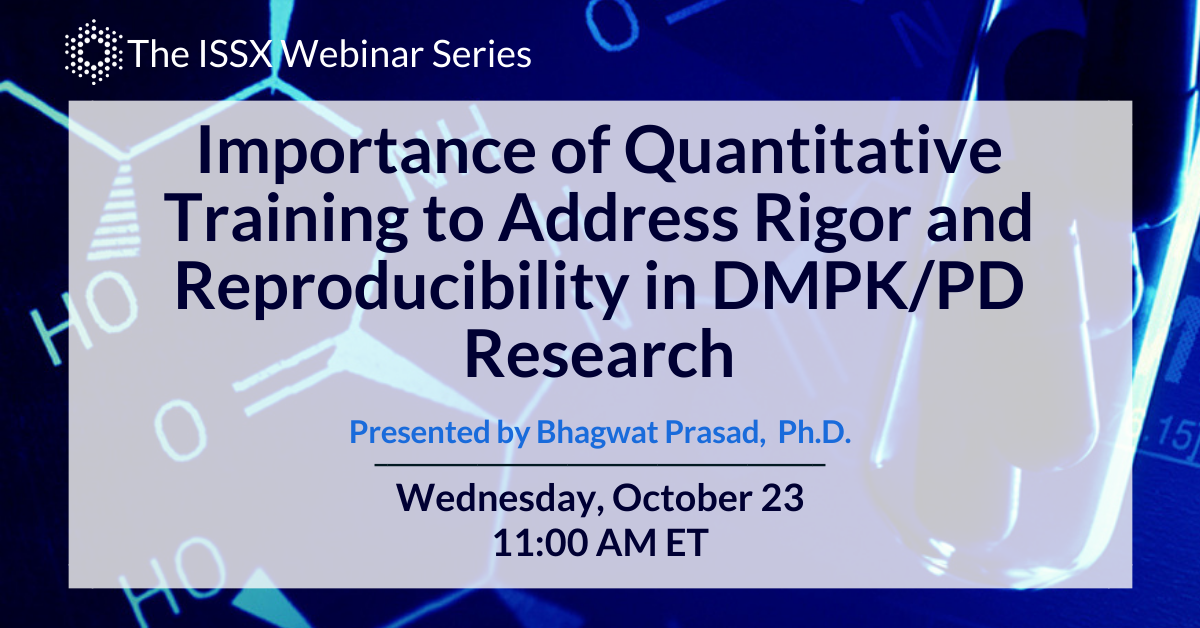
Importance of Quantitative Training to Address Rigor and Reproducibility in DMPK/PD Research | Dr. Bhagwat Prasad
-
Register
- Non-member - $49
- Member - Free!
- Student - Free!
- Premier - Free!
Drug metabolism, pharmacokinetics and pharmacodynamics (DMPK/PD) are integrated multidisciplinary approaches that require training in quantitative methods. From bioanalysis of drugs in body fluids or tissues, metabolic stability and transport kinetics of drugs to modeling and simulation, a DMPK/PD scientist should be trained not only in generating data but how to interpret and eventually integrate these data to address rigor and reproducibility. In this webinar, the speaker will share through case studies why quantitative training is important for different areas of DMPK/PD discipline. Particularly, examples will be discussed how the lack of clear understanding of quantitative methods can affect rigor in DMPK/PD research. The case studies will include topics such as:
-Assessment of lower limit of quantification in bioanalysis and its impact on plasma PK analysis,
-Factors affecting bioanalysis including replicates and batch effect,
-Importance of power analysis in study design,
-Genetic polymorphisms and quantitative phenotype, and
-Assumptions in modeling and simulation.

Bhagwat Prasad
Importance of Quantitative Training to Address Rigor and Reproducibility in DMPK/PD Research
Dr. Bhagwat Prasad is an Associate Professor in the Department of Pharmaceutical Sciences, Washington State University (WSU) in Spokane, WA. He leads several federally and industry-funded research programs on characterization of interindividual variability in drug disposition (drug transport and metabolism). He serves as a director of the proteomics-based research in non-cytochrome P450 enzymes (PRINCE). Prior to moving WSU, Dr. Prasad was an assistant professor at the University of Washington (UW) Seattle and was affiliated with the UW research affiliate program on transporters (UWRAPT) as a co-director. Dr. Prasad has published 75 peer-reviewed articles and 100 conference abstracts and delivered over 60 invited talks at various conferences such as ASPET (EB), ISSX, and ACCP. Dr. Prasad is the recipient of 2018 ISSX North American New Investigator Award. Dr. Prasad's work was selected for the Early Career Faculty Showcase at the 2018 ASPET meeting. Dr. Prasad also serves as a Secretary of the Drug Metabolism and Disposition Division of ASPET. He co-organized 2018 ISSX workshop on quantitative proteomics and was a member of organizing committee for the 12th international ISSX meeting, 2019 held in Portland, OR. Dr. Prasad is a member of editorial board of Drug Metabolism and Disposition. Dr. Prasad obtained his MS in 2006 and Ph.D. in 2010 in Pharmaceutical Sciences from NIPER, Mohali, India and he was a postdoc in the UW Seattle from 2011-2014.
